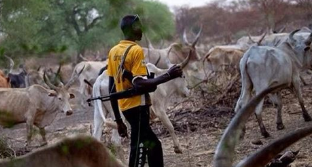... Linking agrobiz, sustainable environs, people & technology
The Pan Yoruba self-determination coalition known as Apapo Oodua Koya (AOKOYA), has urged the South and Middle Belt State Governors to reject the agro-rangers which the Federal Government of Nigeria has proposed to deploy to states, reports NaijaAgroNet.
According to the group in a press statement available to NaijaAgroNet, 'This is RUGA in disguise. It is an attempt to give protection to violent pastorist Fulanis, who are bent on taking over Yoruba territories by force of arms."
Search NaijaAgroNet
Showing posts with label herders. Show all posts
Showing posts with label herders. Show all posts
Friday, November 4, 2022
Tuesday, September 11, 2018
Herders, cattle rustling killings reduced - FG - NaijaAgroNet
The Federal Government (FG) has drastically reduced killings
associated to herders attacks, cattle rustling, trans-border crimes, reports NaijaAgroNet.
Minister of Information and Culture, Alhaji Lai Mohammed,
revealed this at a special town hall meeting on measures by he Federal
Government to curb killings in Gusau, Zamfara State on Monday.
He also said these achievements were as a result of concerted and committed actions
by the government.
Mohammed highlighted some measures taken to curtail the herders
attacks, cattle rustling and other acts
of banditry to include deployment of a Joint Military Intervention Force
(JMIF), comprising Regular and Special Forces personnel from the Army, Air
Force and Navy, and working in collaboration with the Nigeria Police Force, Department
of State Security (DSS), and Nigeria Security and Civil Defense Corps (NSCDC).
In addition, he said, FG established the Army’s 2 Battalion
Forward Operating Base (FOB) in Kanfanin Doka Village, Birnin-Gwari, Kaduna
State.as well as established a new Area Command and two additional Divisional Police Headquarters in the Birnin
Gwari Local Government Area of Kaduna State.
Further, he said, FG established Nigerian Air Force of Quick
Response Wings (QRW) in Benue, Nasarawa and Taraba States, and deployment of
Special Forces to these Quick Response Wings.
He equally said that the inauguration by the Nigeria Police
Force of a new Mobile Squadron in Takum, Taraba State, and Operation 'Whirl
Stroke', operating in Benue, Nasarawa, Taraba and Zamfara states, were to
tackle the menace of armed herdsmen, cattle rustlers, communal militias,
kidnappers and other bandits.
“I have no doubt that the good people of Zamfara can testify
to the drastic reduction in the activities of cattle rustlers and other bandits
in the state since the Federal Government assembled a 1000-strong military
force, comprising the army, air force, police and the civil defence, to launch
fierce attacks on the bandits terrorizing the villages and towns of Zamfara
State. The situation will continue to improve until the violence has stopped,”
he said.
Isaac Oyimah/GEE
Thursday, August 31, 2017
Drought-stricken herders in Ethiopia need urgent support
Supporting herders to get back on their feet and preventing
further livestock losses and suffering are crucial in drought-hit Ethiopia
where hunger has been on the rise this year, warned today the Food and
Agriculture Organization of the United Nations (FAO), reports NaijaAgroNet.
Drought has devastated herders’ livelihoods as it exhausted
pastures and water sources, leading to a significant number of animals dying or
falling ill, particularly in the southern and southeastern regions of the
country as other areas recover from previous seasons’ El Niño-induced drought.
Drought-hit pastoralists face reduced milk production,
rising malnutrition, and have limited income-earning capacity and severely
constrained access to food.
Some 8.5 million people – one in 12 people – are now suffering
from hunger; of these, 3.3 million people live in Somali Region.
The current food and nutrition crisis is significantly
aggravated by the severe blow to pastoral livelihoods. For livestock-dependent
families, the animals can literally mean the difference between life and death,
especially for children, pregnant and nursing women for whom milk is a crucial
source of nutrition.
With up to 2 million animals lost so far, FAO is focusing on
providing emergency livestock support to the most vulnerable pastoralist
communities through animal vaccination and treatment, supplementary feed and
water, rehabilitating water points, and supporting fodder and feed production.
“It is crucial to provide this support between now and
October – when rains are due – to begin the recovery process and prevent
further losses of animals. If we don’t act now, hunger and malnutrition will
only get worse among pastoral communities,” said Abdoul Karim Bah, FAO Deputy
Representative in Ethiopia.
By providing supplementary feed and water for livestock,
while at the same time supporting fodder
production, FAO seeks to protect core breeding animals and enable drought-hit
families to rebuild their livelihoods. Animal health campaigns will be reinforced
to protect animals, particularly before the rains set in, when they are at
their weakest and more susceptible to parasites or infectious diseases.
FAO-supported destocking and cash-for-work programmes will also provide a
crucial source of cash for families.
Subscribe to:
Posts (Atom)




